- Home
- Norman Mailer
The Deer Park Page 33
The Deer Park Read online
Page 33
There was a blob of ink, the beginning of a new paragraph which she had scratched out, and then apparently having decided to end the letter she had signed her name. Looking at the scratched-out line, the blot, and the signature, I wondered how long she had sat there, thinking to add something else as if the reason for writing the letter had eluded her, and drunk, her mind must have wandered over the grab bag of her life until she had decided to grab no more, had put her name down, sealed the envelope, and sent it off.
CHAPTER TWENTY-FOUR
AFTER I read the letter, I went out to see Elena and Marion, but she was shy with me and Marion was difficult so I gave it up. I had picked the wrong evening for I was in as bad a depression as I have ever been, and I remember as I was leaving them after a half-hour of stumbled attempts and expired conversations, Elena stood next to me for a moment in the hall. “You don’t like me any more,” she said.
“Maybe I don’t,” I muttered to her, and closed the door quietly in her face, my depression lifted because I had hurt her, and then it came back again doubly and I lay in my furnished room and I was nowhere. Reading her letter had laid a cloud on me; seeing her with Marion made it worse. I had thought that I knew everything there was to know about the bottom, but I was to learn all over again as one learns each time in his life that there is no such thing as the old bottom, and no matter how bad one feels, one can always feel worse. So I went down and down until the memory of the past day’s depression was nostalgia in its contrast to what I felt today, and my energy began to leave me and I woke up in the morning more tired than I had gone to sleep. I whipped myself those days. I started to write, and I would cover pages with all the scrawls and fishhooks of the handwriting I learned in the orphanage, and in revenge on Lulu, for the worst to be said about a writer is that he can take a coward’s revenge, I wrote long incoherent pages where I tried to destroy her, and all the catechism which had been laid into my skull by good Sister Rose came back to scathe the people I had known at Desert D’Or so that I not only hated Lulu, and hated Eitel and Marion and Elena, but I loathed myself. I never knew such self-pity and I never disliked myself so much, and the worst of it was that I was certain I would never write a good word, and I didn’t have talent, and I didn’t have a girl, and I wondered if I could ever manage to have a girl again, and all in all I was about as brave as an eight-year-old boy at the bottom of an abandoned mine shaft. I thought it would go on forever, but something happened finally, and my sickness came to term, and I climbed from my hole. But I get ahead of myself, and besides I do not really know the reasons.
One night when I got back from my job, there were two men sitting in my room. They were wearing summer suits in some light-gray material, and each of them was holding his hat on his knees, a dark-brown summer straw with a tropical ribbon around the crown. Eitel had not described them too badly—they did look like All-American guard and tackle, but if we are to use the image, I ought to say that there is a difference between guard and tackle. The one who looked like a tackle was very big, he was rangy, he was mean for the pleasure of it: an archetype of the bastard in Dorothea’s book. I knew the moment I looked at him that if it ever got out of control, I could not hope for too much. He could use his hands at least as well as I could, and that would be only the beginning. For he was obviously a man who did not like to lose, and he would know other ways to fight. Before we were through I would come to learn all about his elbows and his knees and how good he was at measuring the heel of his hand against my kidneys, and my neck, and of course the other places. He looked like he had changed more than one man’s features in his life. The guard was a little shorter and a little heavier and he had a friendly face. He was a wrestler. He was the kind of man who would give a pained and modest smile before he got into a bar brawl and then he would throw the nearest man across the room. With it all, they looked to have the intelligence of good athletes, practical intelligence.
“Hello,” I said, “how long have you been here?”
Then I knew it was going to be bad, because I was tired as always, and I had tried to make my voice flat, and it did not hold its pitch. I remember thinking what a serious difference it was going to make that they had come to talk to me in a cheap furnished room instead of the modern house I had had with its built-in bar and the long wall minor to show them their reflection.
The one who looked like a tackle was holding a newspaper clipping in his hand. “Your name O’Shaugnessy or McShonessy,” he said, looking at me. He had a peculiar stare. He did not look into my eyes, he looked at the bridge of my nose, and that was a trick to practice because it made me feel even worse.
“The first name is right.”
“Marine Corps or Air Force?”
“Air Force.”
The one who looked like a guard continued to smile at me.
“Why did you pass yourself off as a Marine Corps captain?” the tackle said.
“I never did.”
“Are you trying to tell me this newspaper item is a lie?”
“Oh look, Mac,” I said, “no newspaper ever makes a mistake.”
He grunted and passed the clipping over to the guard. When the guard spoke it was with a Southern accent. “Boy, why do you spell O’Shaughnessy without an ‘h’?” he asked.
“You’d have to ask my father.”
“He was a convict, wasn’t he?”
“My father was a lot of things,” I said.
“Yes,” the tackle said, “he was a convict.”
I sat down on the bed, for they were in the two chairs, and I went through a careful set of movements to open a package of cigarettes, and I believe I succeeded in doing it without letting my hands shake. But it would have been beyond me to manage to light a cigarette for them. I had no idea at all if they were just passing through Desert D’Or for the day and had dropped in on me to have an hour of entertainment, or if this were all part of some bigger mistake. “Before we go any further,” I said, “would you mind showing me your identification papers?”
We continued to sit there for a minute, and then the tackle took a wallet from his breast pocket and passed over an important-looking card with the stamp of the Subversive Committee on it, and SPECIAL INVESTIGATOR in raised letters under a passport photo. His name was Greene, Harvey Greene.
“Well, what do you want?” I asked.
“To find out a few things about a few people, including you.”
“What is there to find out?”
“We’ll ask the questions. In case you didn’t know, you might be in a little trouble.”
“I don’t see the trouble,” I said.
“Tell me, boy, is Lulu Meyers a Red?” the guard asked.
I made a point of laughing. “You know, I never knew anybody who was a Red. I just never traveled in those circles.”
“But you know Charley Eitel, don’t you, fellow?”
“Yes, I do.”
“Eitel was going around here with people who were politically questionable.”
I was beginning to feel a little better. “Well, he probably gave you their names.”
“He certainly did,” Greene said.
“Tell me about Lulu, fellow,” the guard said.
“We never had a single conversation about politics.”
“What did you talk about?” said Greene.
“Private things.”
“You had private and intimate relations with her?”
“Don’t you know the answer?”
“We’re waiting for you to provide it.”
“I was in love with Lulu,” I said.
Greene’s mouth showed a considerable distaste. “You mean you had depraved and illicit relations with her.”
“I don’t think like that,” I said.
“You don’t think,” Greene told me. “Because if you did, an Irish boy like you wouldn’t go around with these perverts.”
I was very scared then. The only thing about Harvey Greene which fit his name were his eyes—they were
a boiled green in color. Into my mind passed the memory of a policeman with boiled green eyes who had come to the orphanage because a few of us had been making penny raids on candy stores. He had* questioned me for half an hour, and he had made me cry finally by forcing me to admit that I played with myself. So I had the anguish—it is truly the word—that the same thing was going to happen again.
But there are very few policemen who can work as a team all the time, and the guard saved me for a little while. I suspect that he and Greene were a little tired of each other. At any rate, the guard was interested in other things than the state of my soul. “You’re lucky, fellow, to hook up with a movie star,” he said with superior humor, but the hundred-twenty dollars a week he must have made, and the wife and children in the suburbs were also in his voice. “You must have thought it was soft picking up those big dollar bills for going down.”
Underneath everything else I felt, I could sense some opportunity preparing itself. And to my surprise I smiled, and said, “You have a good instinct for personal details.”
“I know enough to know you think you’re pretty good,” said the guard.
“I’m not the one to brag.”
“Don’t brag. We all know movie stars are frigid,” the guard said. He was forward in his seat and he was getting angry. Greene sat by while this was going on, and shook his head sourly. “Wouldn’t you say they’re frigid?” the guard repeated.
“Depends on the man,” I said cautiously.
“Yes,” said the guard, “that would be your theory.” He was getting flushed. “So tell us, hot-rod, tell us about Lulu.” But before I had to worry about what I could possibly compromise to that, the guard was talking again. “I hear,” he started, “that Lulu …” and he continued for a full two minutes. He did not really have a great deal of imagination, but at least he had a divided mind on the subject, and so he went on and on. “Why, I bet no respectable call-girl would talk to her,” he said at last.
I got up all my courage, which is to say I showed more courage than I had. “If you’re going to question me,” I said, “I want to use my tape recorder.”
The guard stopped. The smile went off his face and the flushed eager look, and he sat there looking puzzled. It was the last expression I wished to see on his face. For a moment I was certain I had gone too far, and that when it was all over, and I was in a hospital bed with a broken jaw, and a cast over my collarbone, they would pinch my flesh awake long enough for me to mumble to a police stenographer, “Yes, I admit I was dead-drunk and rolled off a table.”
The guard reached forward from his chair, and poked a finger into my thigh. “We hear you wear a lavender shirt that Teddy Pope gave you,” he said. “You don’t look lavender, boy, but I guess you like lavender.”
“When did they promote you from the vice squad?” I asked.
Greene entered into it then. He looked at the space between my eyes. “Say one more thing like that,” he said.
I was closer to being hysterical than I care to admit, but there is a curious calm this side of hysteria. At least for me. I was that near to breaking down, and yet my voice came out quietly and evenly and slowly. “Greene,” I said, “I’ve got three thousand dollars in the bank, and I’ll use those three thousand dollars for a lawyer. So try and think about the publicity your committee is going to get when it comes out that you’ve pulled a rock with an Air Force flier.” It sounded good to me and I did not mention the medical discharge.
“You’re a subversive and a pervert,” Greene said.
“Put that in writing and I’ll sue you for slander.”
“Don’t you just talk a lot?” Greene said.
I suppose I would have been something of a hero if I had invited him to come downstairs, but instead I smiled again. “Everybody talks a lot,” I said.
They got up then to go—I remember thinking with a little amazement that maybe they were a little afraid of me, too—and at the door, Greene stopped and turned around and said, “Don’t leave town without notifying us.”
“Yes, you send me a paper to that effect.”
“Just don’t leave town,” he said, and he went out the door, and I waited a minute, and went over to lock it so they would not come back on me, and then I lay down on my bed and let myself go.
Because these finally were the kind of men I had grown up with—their shadow had been over the orphanage—and when all was said I knew that I was not so different from them, not nearly so different as I liked to think. All the while they had been in my room and we had talked, I had been nervously and crucially divided, and much of me had been agreeing with everything they said. So I had another inkling of the kind of secret dialogues which had been going on in me through the years, and I lay there for more than one night, exhausted and empty after washing dishes, and I began to think, at least I learned how to try to think, for to do that, one must be ready to live in a hunt for the most elusive game—our real motive or motives and not the ostensible reason—and therefore I would have to look into myself. But that was not the easiest thing to do, for what did I have to discover? I was nothing, a false Irishman from a real orphanage, a boxer without a punch, a flier whose reflexes were gone, a potential stool-pigeon for every policeman who would use his knuckle, and worst of all, a preliminary boy in the bedroom—that was something to stop thought forever. For who can know more, when to know more is to say to oneself, “It is not going to be very good for me if I keep on thinking.” What was the worst, if I did not watch out, I would be a patsy in the world, that was the worst which could happen to a graduate from the orphanage. Too many men and too much history seemed to add up to no more than the death of the patsies. And then of course I knew no history, that too occurred to me, and if I was going to speak up to the rough world out there, it was time for me to open a book.
So with the grace of a cow kicking flop, and with the old private worry that perhaps I had taken a punch too many on the head and would never be able to think that well after all, I stumbled into the kind of things which everybody has wrestled with, one way and then another; I thought of courage and of cowardice, and how we are all brave and all terrified each in our own way and our private changing proportion, and I thought of honesty and deception, and the dance of life they make, for it is exactly when we come closest to another that we are turned away with a lie, and blunder forward on a misconception, moving to understand ourselves on the platitudes and lies of the past. And, vaguely, thinking of certain words not as words but as the serious divisions of my experience, and every man’s experience is serious to himself, I thought of such couples as love and hate, and victory and defeat, and what it was to feel warm and what it was to be cool. I explored with humility and early arrogance, lying on that lumpy bed, reduced to heat rash and to panic, knowing I was weak and wondering if I would ever be strong. For I touched the bottom myself, there was a bottom that time. I returned to it, I wallowed in it, I looked at myself, and the longer I looked the less terrifying it became and the more understandable. I began then to make those first painful efforts to acquire the most elusive habit of all, the mind of the writer, and though I could hardly judge from my early pages whether I were a talent or a fool, I continued, I went on for a little while, until I ended with an idea that many men have had, and many will have again—and indeed I started with that idea—but I knew that finally one must do, simply do, for we act in total ignorance and yet in honest ignorance we must act, or we can never learn for we can hardly believe what we are told, we can only measure what has happened inside ourselves. So I wrote a few poor pages and gave them up and knew I would try again.
In the meantime I did not hear from the detectives, and slowly I came to decide that it was time for me to leave Desert D’Or, and if I was in real trouble with them, which I doubted, well that for that. I would go to Mexico, the idea appealed to me, and I would take a course on a veteran’s allotment in some Mexican art school, or I would study archaeology—a good way to spend one’s life in the sun.
The Government owed me something after all, and a man has to live and there are not fourteen-thousand-dollar poker games every year. I even began to play with a very curious idea. The more I thought of Elena the more I disliked myself for the way I acted toward her the last time at Marion’s, and I came to feel my way to the understanding that a part of how I had judged her letter came from whatever it was I had failed to delight in Lulu, and I would leave to the side whose fault it was there, and how much, and from whom. All the while Elena’s letter had its slow effect on me, and I read it over many times, as I had once read Eitel’s testimony, and after a while I decided I owed Elena a debt; that was the way I felt. So I was going to visit her and Marion again, and if I thought she was not doing so well with him—and in my heart I was certain it was worse than that—well, I was going to make her an offer. She could come to Mexico with me, and we would even make the trip as brother and sister if she wanted it that way, although looking back I know that this last idea was something I could not have meant too seriously. At any rate, the more I thought about it, the better I came to like the prospect, although at other hours I decided I would be mad to take Elena on. Because, looking back, I know that deep in me I had already come to learn that there are not all that many chances in life, and if Elena and I took to each other, it was going to be no casual affair, and so it was a question of whether Elena and I had the characters to begin to bring out the best in each other, and I was doubtful of that, but on the other hand I was probably young enough to take a chance. So, living with the opposites in ourselves, we move to a decision. Only I meandered and debated and enjoyed the idea I was an altruist until a little too much time went by. And then one night as I was coming off my dishwasher’s shift I heard from a waitress about what had happened to Marion and Elena that evening, and it was shocking news. For better or for worse, I had probably waited a little too long.

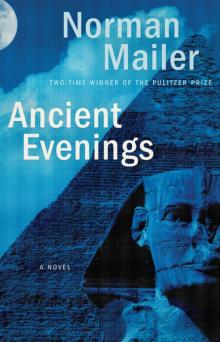 Ancient Evenings
Ancient Evenings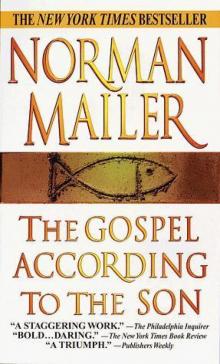 The Gospel According to the Son
The Gospel According to the Son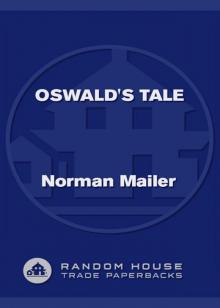 Oswald's Tale: An American Mystery
Oswald's Tale: An American Mystery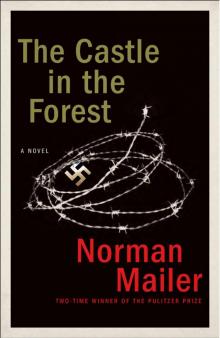 The Castle in the Forest
The Castle in the Forest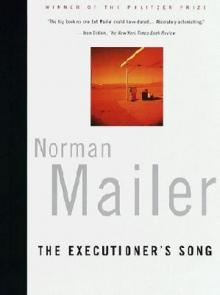 The Executioner's Song
The Executioner's Song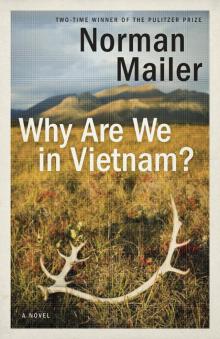 Why Are We in Vietnam?
Why Are We in Vietnam?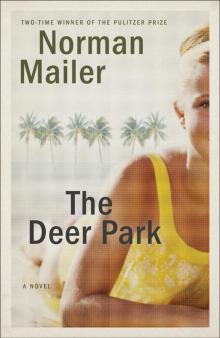 The Deer Park: A Play
The Deer Park: A Play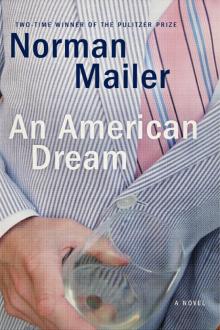 An American Dream
An American Dream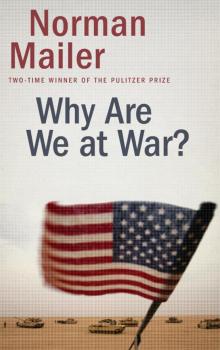 Why Are We at War?
Why Are We at War?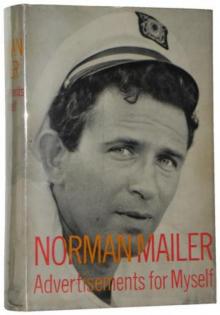 The Time of Her Time
The Time of Her Time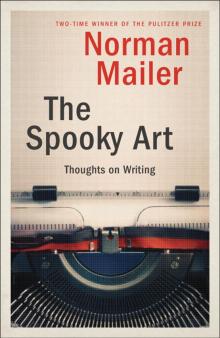 The Spooky Art: Thoughts on Writing
The Spooky Art: Thoughts on Writing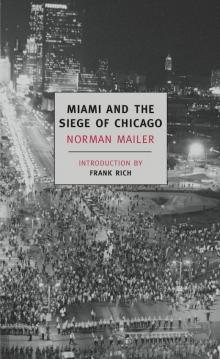 Miami and the Siege of Chicago
Miami and the Siege of Chicago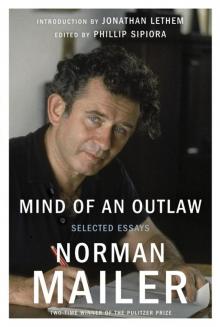 Mind of an Outlaw: Selected Essays
Mind of an Outlaw: Selected Essays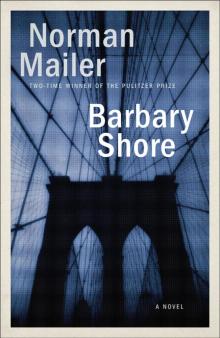 Barbary Shore
Barbary Shore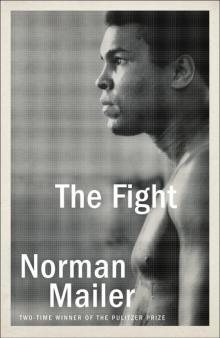 The Fight
The Fight Harlot's Ghost
Harlot's Ghost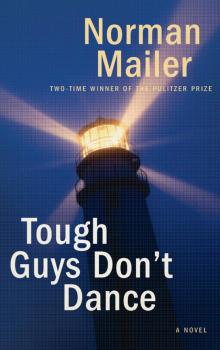 Tough Guys Don't Dance
Tough Guys Don't Dance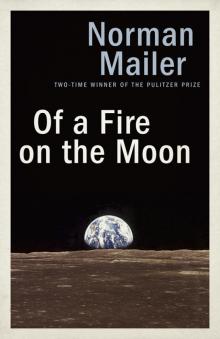 Of a Fire on the Moon
Of a Fire on the Moon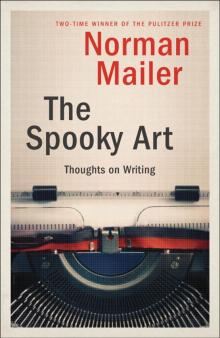 The Spooky Art
The Spooky Art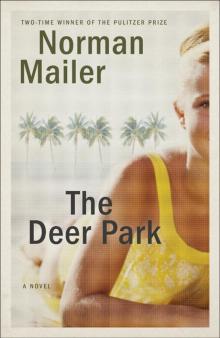 The Deer Park
The Deer Park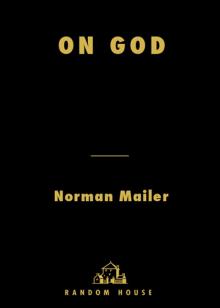 On God: An Uncommon Conversation
On God: An Uncommon Conversation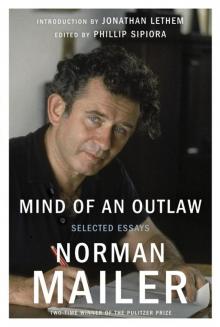 Mind of an Outlaw
Mind of an Outlaw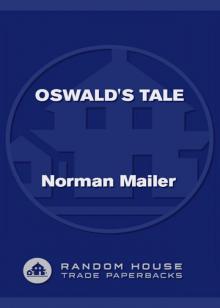 Oswald's Tale
Oswald's Tale